Comprehensive Report: London's Travel and Tourism Industry Analysis
VerifiedAdded on 2019/12/28
|16
|5208
|179
Report
AI Summary
This report provides a comprehensive analysis of the travel and tourism industry in London. It begins with an overview of the historical development of the sector, tracing its evolution from the primitive era to the present day, highlighting key milestones such as the industrial revolution and the emergence of travel companies. The report then details the structure of the London travel and tourism sector, including accommodation, travel agents, public sector involvement, and transportation infrastructure. Furthermore, it examines the functions of government, government-sponsored bodies, and international agencies in supporting the industry, as well as the influence of local and national economic policies. The report also assesses factors impacting tourism demand and supply, and evaluates the positive and negative economic, environmental, and social impacts of tourism, along with strategies to mitigate negative effects and maximize benefits. The report focuses on the United Kingdom and provides insights into the dynamics of the travel and tourism industry within this context.
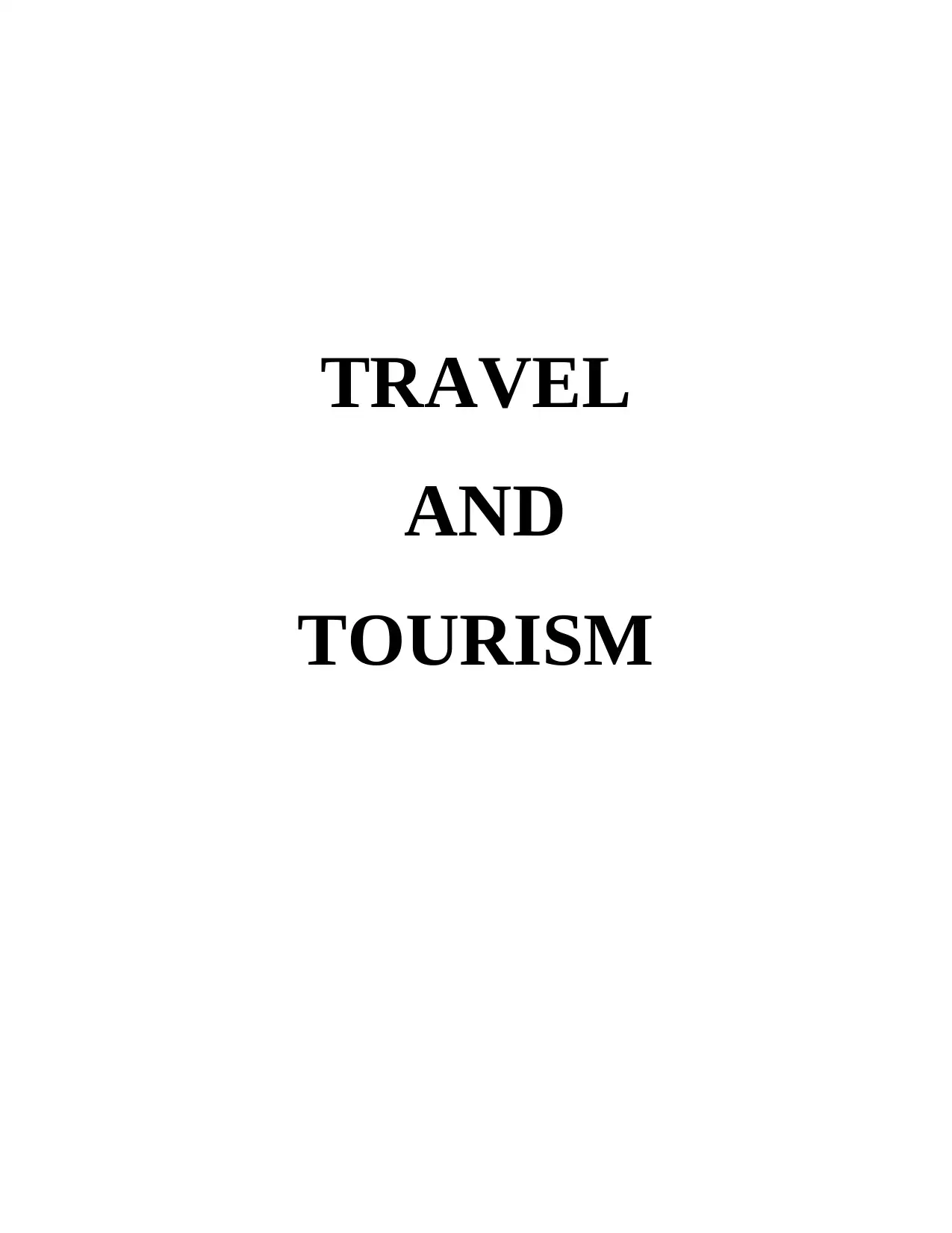
TRAVEL
AND
TOURISM
AND
TOURISM
Paraphrase This Document
Need a fresh take? Get an instant paraphrase of this document with our AI Paraphraser
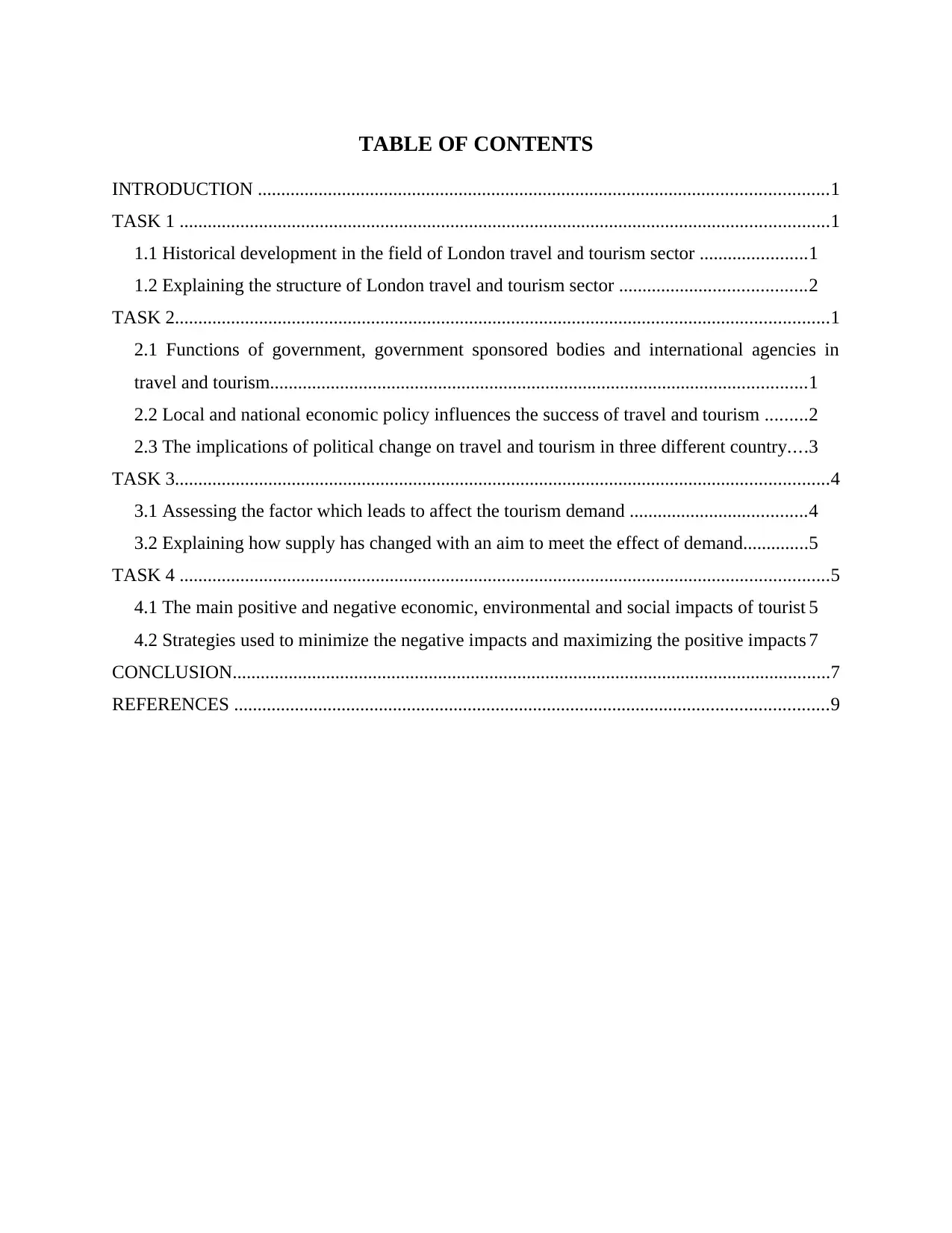
TABLE OF CONTENTS
INTRODUCTION ..........................................................................................................................1
TASK 1 ...........................................................................................................................................1
1.1 Historical development in the field of London travel and tourism sector .......................1
1.2 Explaining the structure of London travel and tourism sector ........................................2
TASK 2............................................................................................................................................1
2.1 Functions of government, government sponsored bodies and international agencies in
travel and tourism...................................................................................................................1
2.2 Local and national economic policy influences the success of travel and tourism .........2
2.3 The implications of political change on travel and tourism in three different country....3
TASK 3............................................................................................................................................4
3.1 Assessing the factor which leads to affect the tourism demand ......................................4
3.2 Explaining how supply has changed with an aim to meet the effect of demand..............5
TASK 4 ...........................................................................................................................................5
4.1 The main positive and negative economic, environmental and social impacts of tourist 5
4.2 Strategies used to minimize the negative impacts and maximizing the positive impacts 7
CONCLUSION................................................................................................................................7
REFERENCES ...............................................................................................................................9
INTRODUCTION ..........................................................................................................................1
TASK 1 ...........................................................................................................................................1
1.1 Historical development in the field of London travel and tourism sector .......................1
1.2 Explaining the structure of London travel and tourism sector ........................................2
TASK 2............................................................................................................................................1
2.1 Functions of government, government sponsored bodies and international agencies in
travel and tourism...................................................................................................................1
2.2 Local and national economic policy influences the success of travel and tourism .........2
2.3 The implications of political change on travel and tourism in three different country....3
TASK 3............................................................................................................................................4
3.1 Assessing the factor which leads to affect the tourism demand ......................................4
3.2 Explaining how supply has changed with an aim to meet the effect of demand..............5
TASK 4 ...........................................................................................................................................5
4.1 The main positive and negative economic, environmental and social impacts of tourist 5
4.2 Strategies used to minimize the negative impacts and maximizing the positive impacts 7
CONCLUSION................................................................................................................................7
REFERENCES ...............................................................................................................................9
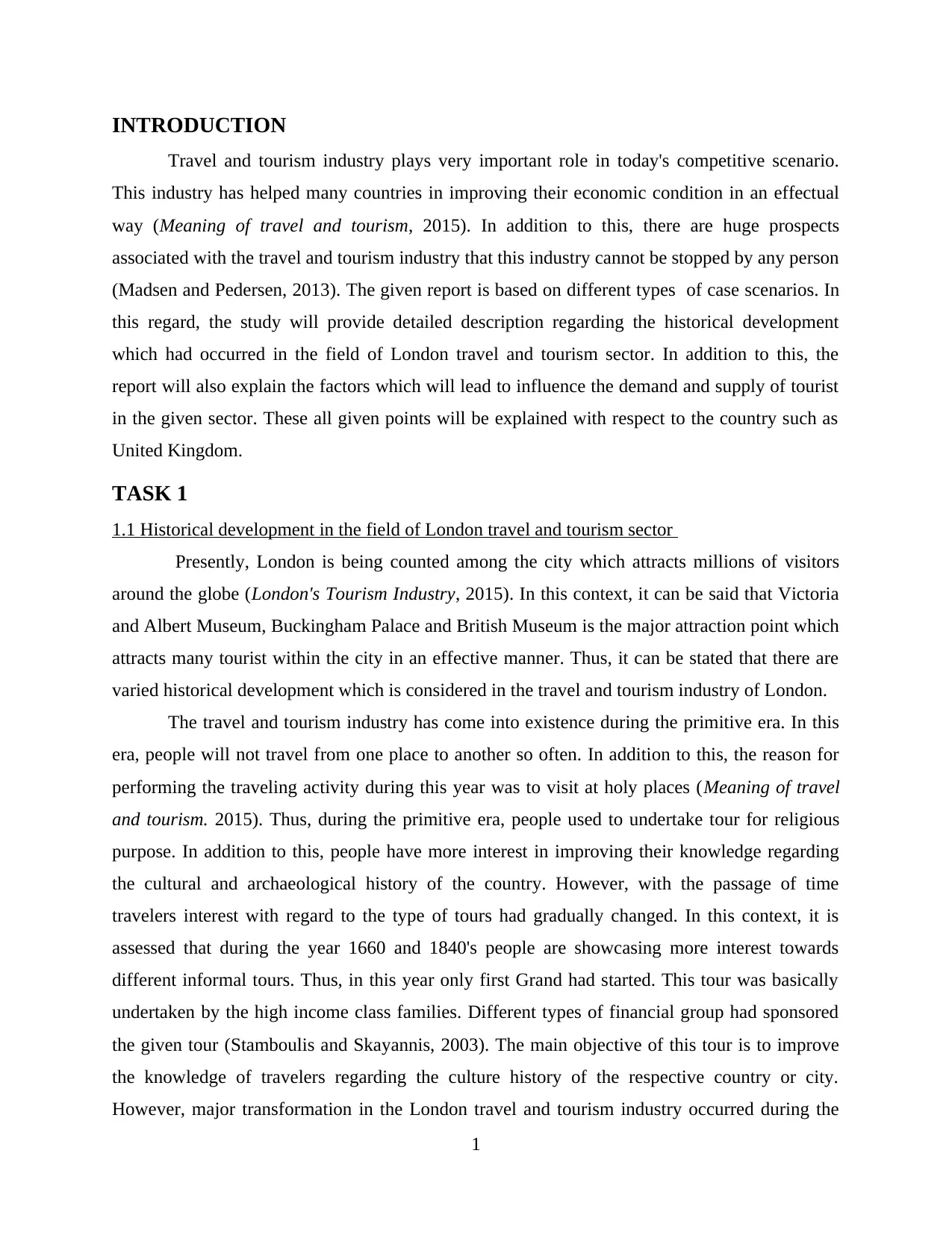
INTRODUCTION
Travel and tourism industry plays very important role in today's competitive scenario.
This industry has helped many countries in improving their economic condition in an effectual
way (Meaning of travel and tourism, 2015). In addition to this, there are huge prospects
associated with the travel and tourism industry that this industry cannot be stopped by any person
(Madsen and Pedersen, 2013). The given report is based on different types of case scenarios. In
this regard, the study will provide detailed description regarding the historical development
which had occurred in the field of London travel and tourism sector. In addition to this, the
report will also explain the factors which will lead to influence the demand and supply of tourist
in the given sector. These all given points will be explained with respect to the country such as
United Kingdom.
TASK 1
1.1 Historical development in the field of London travel and tourism sector
Presently, London is being counted among the city which attracts millions of visitors
around the globe (London's Tourism Industry, 2015). In this context, it can be said that Victoria
and Albert Museum, Buckingham Palace and British Museum is the major attraction point which
attracts many tourist within the city in an effective manner. Thus, it can be stated that there are
varied historical development which is considered in the travel and tourism industry of London.
The travel and tourism industry has come into existence during the primitive era. In this
era, people will not travel from one place to another so often. In addition to this, the reason for
performing the traveling activity during this year was to visit at holy places (Meaning of travel
and tourism. 2015). Thus, during the primitive era, people used to undertake tour for religious
purpose. In addition to this, people have more interest in improving their knowledge regarding
the cultural and archaeological history of the country. However, with the passage of time
travelers interest with regard to the type of tours had gradually changed. In this context, it is
assessed that during the year 1660 and 1840's people are showcasing more interest towards
different informal tours. Thus, in this year only first Grand had started. This tour was basically
undertaken by the high income class families. Different types of financial group had sponsored
the given tour (Stamboulis and Skayannis, 2003). The main objective of this tour is to improve
the knowledge of travelers regarding the culture history of the respective country or city.
However, major transformation in the London travel and tourism industry occurred during the
1
Travel and tourism industry plays very important role in today's competitive scenario.
This industry has helped many countries in improving their economic condition in an effectual
way (Meaning of travel and tourism, 2015). In addition to this, there are huge prospects
associated with the travel and tourism industry that this industry cannot be stopped by any person
(Madsen and Pedersen, 2013). The given report is based on different types of case scenarios. In
this regard, the study will provide detailed description regarding the historical development
which had occurred in the field of London travel and tourism sector. In addition to this, the
report will also explain the factors which will lead to influence the demand and supply of tourist
in the given sector. These all given points will be explained with respect to the country such as
United Kingdom.
TASK 1
1.1 Historical development in the field of London travel and tourism sector
Presently, London is being counted among the city which attracts millions of visitors
around the globe (London's Tourism Industry, 2015). In this context, it can be said that Victoria
and Albert Museum, Buckingham Palace and British Museum is the major attraction point which
attracts many tourist within the city in an effective manner. Thus, it can be stated that there are
varied historical development which is considered in the travel and tourism industry of London.
The travel and tourism industry has come into existence during the primitive era. In this
era, people will not travel from one place to another so often. In addition to this, the reason for
performing the traveling activity during this year was to visit at holy places (Meaning of travel
and tourism. 2015). Thus, during the primitive era, people used to undertake tour for religious
purpose. In addition to this, people have more interest in improving their knowledge regarding
the cultural and archaeological history of the country. However, with the passage of time
travelers interest with regard to the type of tours had gradually changed. In this context, it is
assessed that during the year 1660 and 1840's people are showcasing more interest towards
different informal tours. Thus, in this year only first Grand had started. This tour was basically
undertaken by the high income class families. Different types of financial group had sponsored
the given tour (Stamboulis and Skayannis, 2003). The main objective of this tour is to improve
the knowledge of travelers regarding the culture history of the respective country or city.
However, major transformation in the London travel and tourism industry occurred during the
1
⊘ This is a preview!⊘
Do you want full access?
Subscribe today to unlock all pages.

Trusted by 1+ million students worldwide
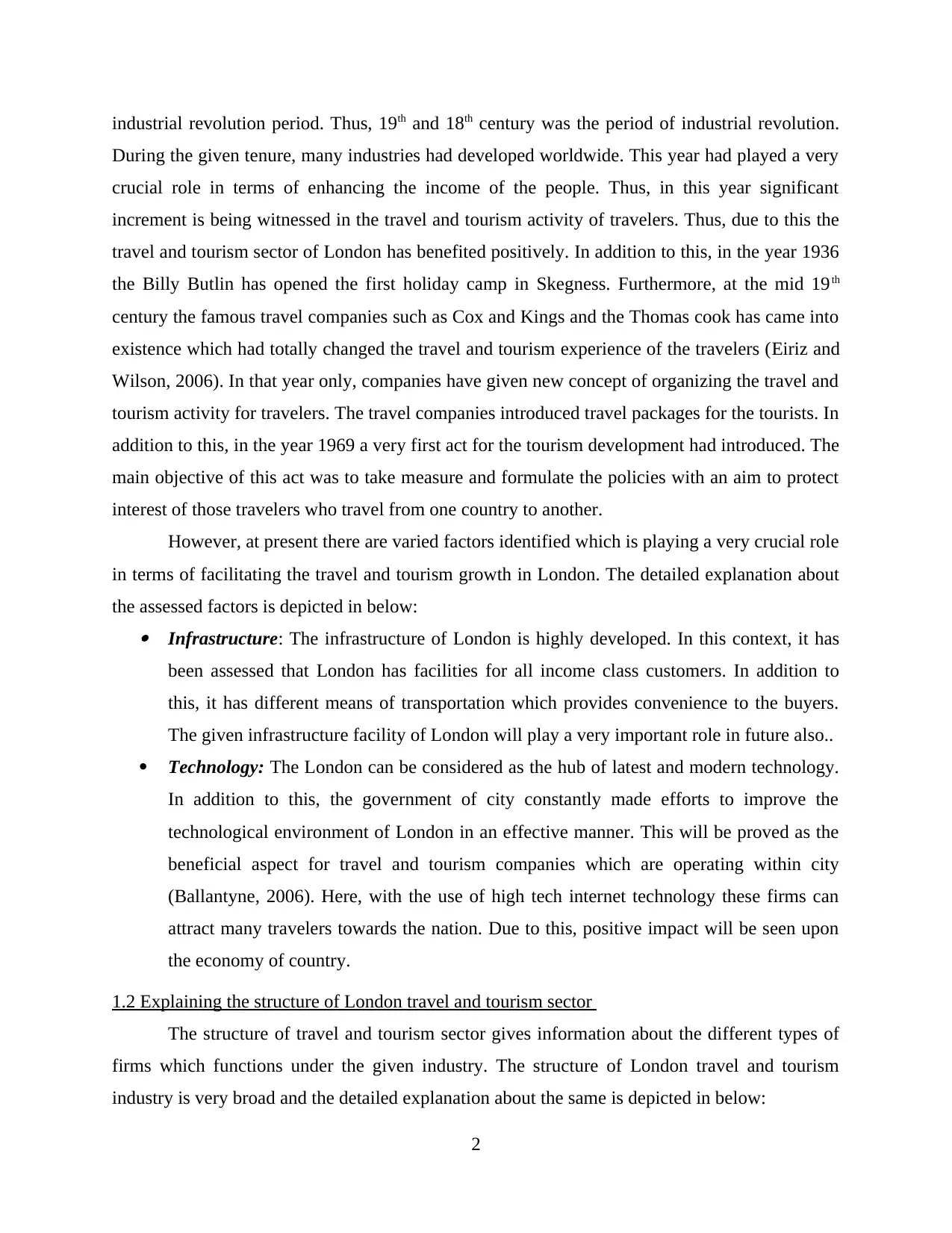
industrial revolution period. Thus, 19th and 18th century was the period of industrial revolution.
During the given tenure, many industries had developed worldwide. This year had played a very
crucial role in terms of enhancing the income of the people. Thus, in this year significant
increment is being witnessed in the travel and tourism activity of travelers. Thus, due to this the
travel and tourism sector of London has benefited positively. In addition to this, in the year 1936
the Billy Butlin has opened the first holiday camp in Skegness. Furthermore, at the mid 19th
century the famous travel companies such as Cox and Kings and the Thomas cook has came into
existence which had totally changed the travel and tourism experience of the travelers (Eiriz and
Wilson, 2006). In that year only, companies have given new concept of organizing the travel and
tourism activity for travelers. The travel companies introduced travel packages for the tourists. In
addition to this, in the year 1969 a very first act for the tourism development had introduced. The
main objective of this act was to take measure and formulate the policies with an aim to protect
interest of those travelers who travel from one country to another.
However, at present there are varied factors identified which is playing a very crucial role
in terms of facilitating the travel and tourism growth in London. The detailed explanation about
the assessed factors is depicted in below: Infrastructure: The infrastructure of London is highly developed. In this context, it has
been assessed that London has facilities for all income class customers. In addition to
this, it has different means of transportation which provides convenience to the buyers.
The given infrastructure facility of London will play a very important role in future also..
Technology: The London can be considered as the hub of latest and modern technology.
In addition to this, the government of city constantly made efforts to improve the
technological environment of London in an effective manner. This will be proved as the
beneficial aspect for travel and tourism companies which are operating within city
(Ballantyne, 2006). Here, with the use of high tech internet technology these firms can
attract many travelers towards the nation. Due to this, positive impact will be seen upon
the economy of country.
1.2 Explaining the structure of London travel and tourism sector
The structure of travel and tourism sector gives information about the different types of
firms which functions under the given industry. The structure of London travel and tourism
industry is very broad and the detailed explanation about the same is depicted in below:
2
During the given tenure, many industries had developed worldwide. This year had played a very
crucial role in terms of enhancing the income of the people. Thus, in this year significant
increment is being witnessed in the travel and tourism activity of travelers. Thus, due to this the
travel and tourism sector of London has benefited positively. In addition to this, in the year 1936
the Billy Butlin has opened the first holiday camp in Skegness. Furthermore, at the mid 19th
century the famous travel companies such as Cox and Kings and the Thomas cook has came into
existence which had totally changed the travel and tourism experience of the travelers (Eiriz and
Wilson, 2006). In that year only, companies have given new concept of organizing the travel and
tourism activity for travelers. The travel companies introduced travel packages for the tourists. In
addition to this, in the year 1969 a very first act for the tourism development had introduced. The
main objective of this act was to take measure and formulate the policies with an aim to protect
interest of those travelers who travel from one country to another.
However, at present there are varied factors identified which is playing a very crucial role
in terms of facilitating the travel and tourism growth in London. The detailed explanation about
the assessed factors is depicted in below: Infrastructure: The infrastructure of London is highly developed. In this context, it has
been assessed that London has facilities for all income class customers. In addition to
this, it has different means of transportation which provides convenience to the buyers.
The given infrastructure facility of London will play a very important role in future also..
Technology: The London can be considered as the hub of latest and modern technology.
In addition to this, the government of city constantly made efforts to improve the
technological environment of London in an effective manner. This will be proved as the
beneficial aspect for travel and tourism companies which are operating within city
(Ballantyne, 2006). Here, with the use of high tech internet technology these firms can
attract many travelers towards the nation. Due to this, positive impact will be seen upon
the economy of country.
1.2 Explaining the structure of London travel and tourism sector
The structure of travel and tourism sector gives information about the different types of
firms which functions under the given industry. The structure of London travel and tourism
industry is very broad and the detailed explanation about the same is depicted in below:
2
Paraphrase This Document
Need a fresh take? Get an instant paraphrase of this document with our AI Paraphraser
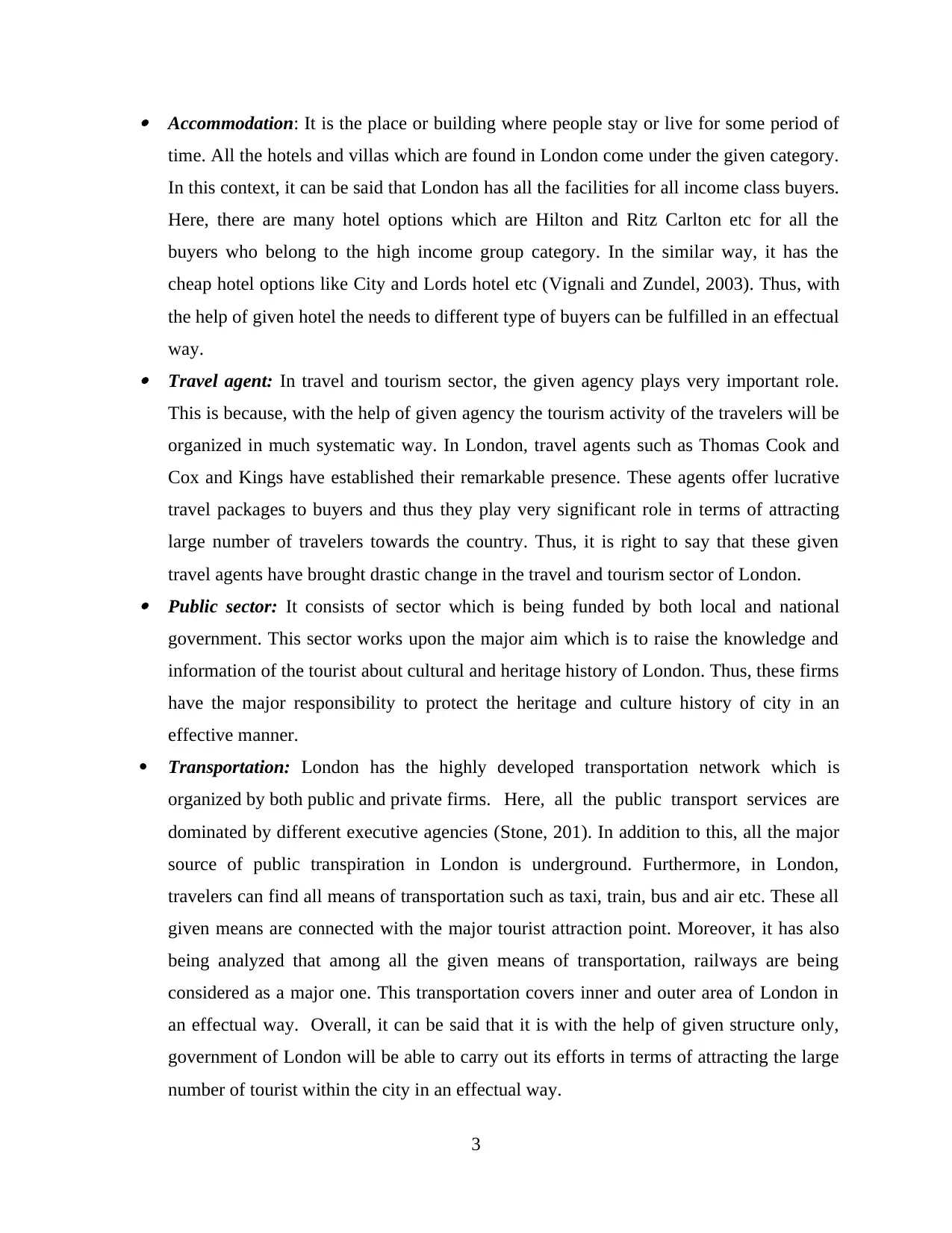
Accommodation: It is the place or building where people stay or live for some period of
time. All the hotels and villas which are found in London come under the given category.
In this context, it can be said that London has all the facilities for all income class buyers.
Here, there are many hotel options which are Hilton and Ritz Carlton etc for all the
buyers who belong to the high income group category. In the similar way, it has the
cheap hotel options like City and Lords hotel etc (Vignali and Zundel, 2003). Thus, with
the help of given hotel the needs to different type of buyers can be fulfilled in an effectual
way. Travel agent: In travel and tourism sector, the given agency plays very important role.
This is because, with the help of given agency the tourism activity of the travelers will be
organized in much systematic way. In London, travel agents such as Thomas Cook and
Cox and Kings have established their remarkable presence. These agents offer lucrative
travel packages to buyers and thus they play very significant role in terms of attracting
large number of travelers towards the country. Thus, it is right to say that these given
travel agents have brought drastic change in the travel and tourism sector of London. Public sector: It consists of sector which is being funded by both local and national
government. This sector works upon the major aim which is to raise the knowledge and
information of the tourist about cultural and heritage history of London. Thus, these firms
have the major responsibility to protect the heritage and culture history of city in an
effective manner.
Transportation: London has the highly developed transportation network which is
organized by both public and private firms. Here, all the public transport services are
dominated by different executive agencies (Stone, 201). In addition to this, all the major
source of public transpiration in London is underground. Furthermore, in London,
travelers can find all means of transportation such as taxi, train, bus and air etc. These all
given means are connected with the major tourist attraction point. Moreover, it has also
being analyzed that among all the given means of transportation, railways are being
considered as a major one. This transportation covers inner and outer area of London in
an effectual way. Overall, it can be said that it is with the help of given structure only,
government of London will be able to carry out its efforts in terms of attracting the large
number of tourist within the city in an effectual way.
3
time. All the hotels and villas which are found in London come under the given category.
In this context, it can be said that London has all the facilities for all income class buyers.
Here, there are many hotel options which are Hilton and Ritz Carlton etc for all the
buyers who belong to the high income group category. In the similar way, it has the
cheap hotel options like City and Lords hotel etc (Vignali and Zundel, 2003). Thus, with
the help of given hotel the needs to different type of buyers can be fulfilled in an effectual
way. Travel agent: In travel and tourism sector, the given agency plays very important role.
This is because, with the help of given agency the tourism activity of the travelers will be
organized in much systematic way. In London, travel agents such as Thomas Cook and
Cox and Kings have established their remarkable presence. These agents offer lucrative
travel packages to buyers and thus they play very significant role in terms of attracting
large number of travelers towards the country. Thus, it is right to say that these given
travel agents have brought drastic change in the travel and tourism sector of London. Public sector: It consists of sector which is being funded by both local and national
government. This sector works upon the major aim which is to raise the knowledge and
information of the tourist about cultural and heritage history of London. Thus, these firms
have the major responsibility to protect the heritage and culture history of city in an
effective manner.
Transportation: London has the highly developed transportation network which is
organized by both public and private firms. Here, all the public transport services are
dominated by different executive agencies (Stone, 201). In addition to this, all the major
source of public transpiration in London is underground. Furthermore, in London,
travelers can find all means of transportation such as taxi, train, bus and air etc. These all
given means are connected with the major tourist attraction point. Moreover, it has also
being analyzed that among all the given means of transportation, railways are being
considered as a major one. This transportation covers inner and outer area of London in
an effectual way. Overall, it can be said that it is with the help of given structure only,
government of London will be able to carry out its efforts in terms of attracting the large
number of tourist within the city in an effectual way.
3
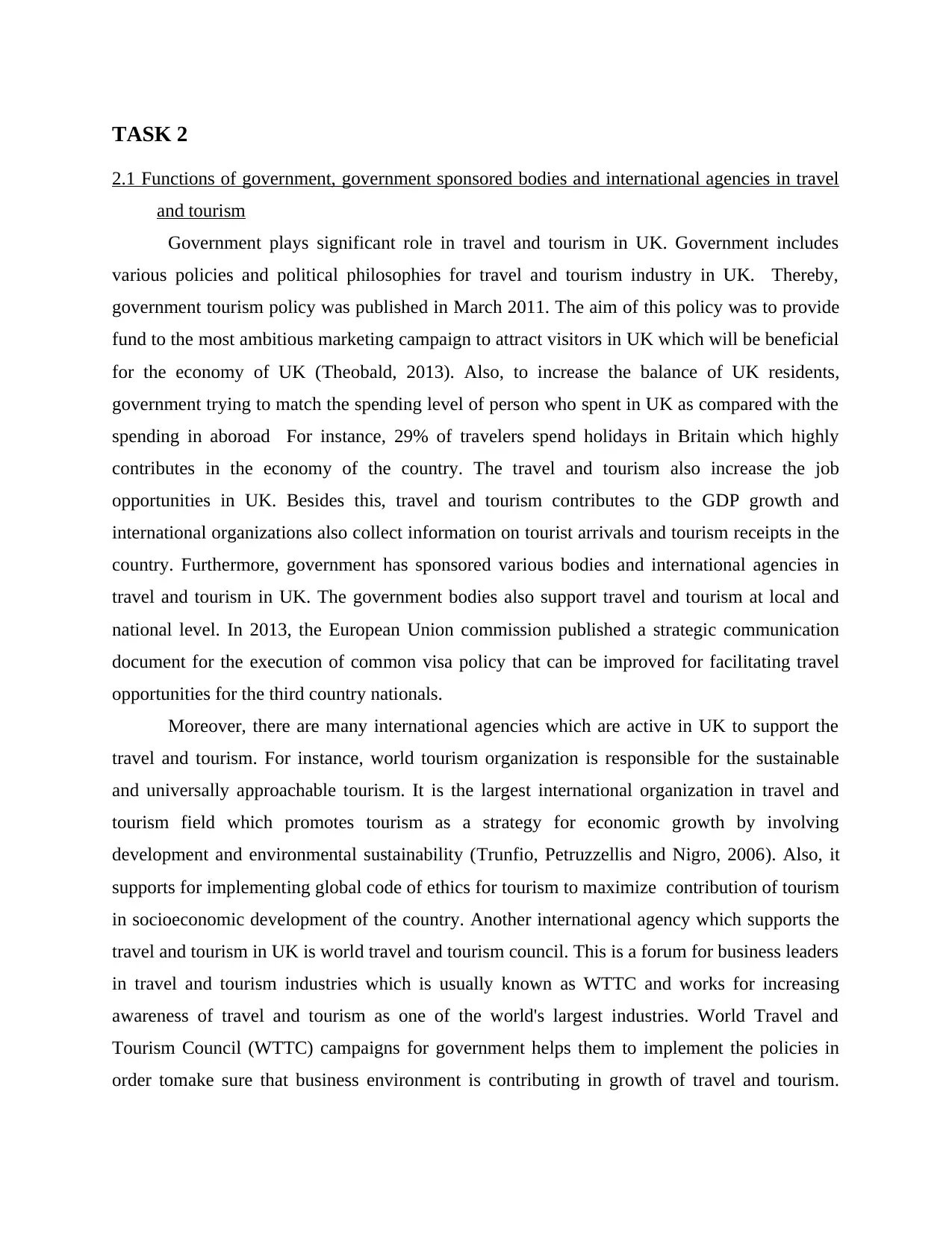
TASK 2
2.1 Functions of government, government sponsored bodies and international agencies in travel
and tourism
Government plays significant role in travel and tourism in UK. Government includes
various policies and political philosophies for travel and tourism industry in UK. Thereby,
government tourism policy was published in March 2011. The aim of this policy was to provide
fund to the most ambitious marketing campaign to attract visitors in UK which will be beneficial
for the economy of UK (Theobald, 2013). Also, to increase the balance of UK residents,
government trying to match the spending level of person who spent in UK as compared with the
spending in aboroad For instance, 29% of travelers spend holidays in Britain which highly
contributes in the economy of the country. The travel and tourism also increase the job
opportunities in UK. Besides this, travel and tourism contributes to the GDP growth and
international organizations also collect information on tourist arrivals and tourism receipts in the
country. Furthermore, government has sponsored various bodies and international agencies in
travel and tourism in UK. The government bodies also support travel and tourism at local and
national level. In 2013, the European Union commission published a strategic communication
document for the execution of common visa policy that can be improved for facilitating travel
opportunities for the third country nationals.
Moreover, there are many international agencies which are active in UK to support the
travel and tourism. For instance, world tourism organization is responsible for the sustainable
and universally approachable tourism. It is the largest international organization in travel and
tourism field which promotes tourism as a strategy for economic growth by involving
development and environmental sustainability (Trunfio, Petruzzellis and Nigro, 2006). Also, it
supports for implementing global code of ethics for tourism to maximize contribution of tourism
in socioeconomic development of the country. Another international agency which supports the
travel and tourism in UK is world travel and tourism council. This is a forum for business leaders
in travel and tourism industries which is usually known as WTTC and works for increasing
awareness of travel and tourism as one of the world's largest industries. World Travel and
Tourism Council (WTTC) campaigns for government helps them to implement the policies in
order tomake sure that business environment is contributing in growth of travel and tourism.
2.1 Functions of government, government sponsored bodies and international agencies in travel
and tourism
Government plays significant role in travel and tourism in UK. Government includes
various policies and political philosophies for travel and tourism industry in UK. Thereby,
government tourism policy was published in March 2011. The aim of this policy was to provide
fund to the most ambitious marketing campaign to attract visitors in UK which will be beneficial
for the economy of UK (Theobald, 2013). Also, to increase the balance of UK residents,
government trying to match the spending level of person who spent in UK as compared with the
spending in aboroad For instance, 29% of travelers spend holidays in Britain which highly
contributes in the economy of the country. The travel and tourism also increase the job
opportunities in UK. Besides this, travel and tourism contributes to the GDP growth and
international organizations also collect information on tourist arrivals and tourism receipts in the
country. Furthermore, government has sponsored various bodies and international agencies in
travel and tourism in UK. The government bodies also support travel and tourism at local and
national level. In 2013, the European Union commission published a strategic communication
document for the execution of common visa policy that can be improved for facilitating travel
opportunities for the third country nationals.
Moreover, there are many international agencies which are active in UK to support the
travel and tourism. For instance, world tourism organization is responsible for the sustainable
and universally approachable tourism. It is the largest international organization in travel and
tourism field which promotes tourism as a strategy for economic growth by involving
development and environmental sustainability (Trunfio, Petruzzellis and Nigro, 2006). Also, it
supports for implementing global code of ethics for tourism to maximize contribution of tourism
in socioeconomic development of the country. Another international agency which supports the
travel and tourism in UK is world travel and tourism council. This is a forum for business leaders
in travel and tourism industries which is usually known as WTTC and works for increasing
awareness of travel and tourism as one of the world's largest industries. World Travel and
Tourism Council (WTTC) campaigns for government helps them to implement the policies in
order tomake sure that business environment is contributing in growth of travel and tourism.
⊘ This is a preview!⊘
Do you want full access?
Subscribe today to unlock all pages.

Trusted by 1+ million students worldwide
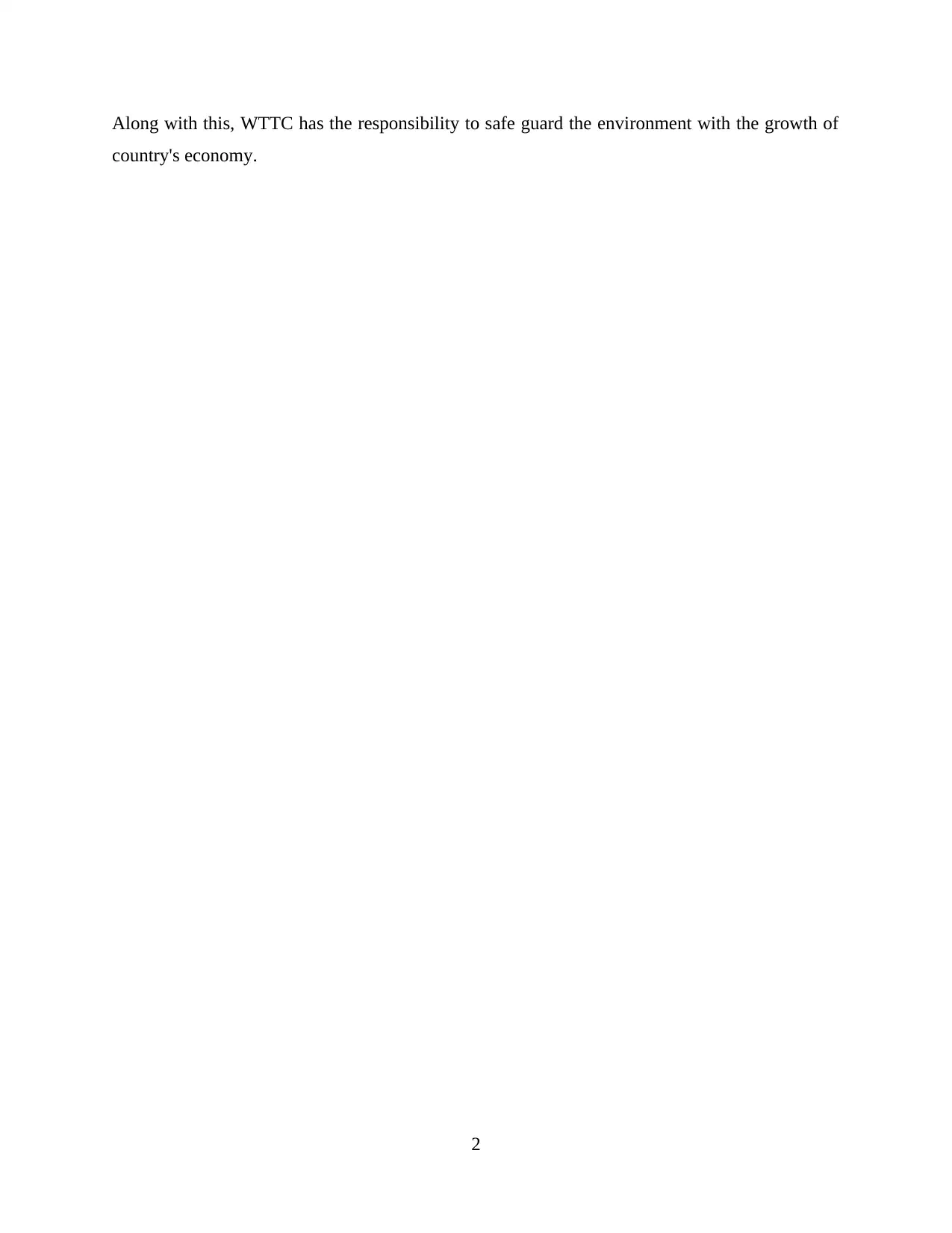
Along with this, WTTC has the responsibility to safe guard the environment with the growth of
country's economy.
2
country's economy.
2
Paraphrase This Document
Need a fresh take? Get an instant paraphrase of this document with our AI Paraphraser
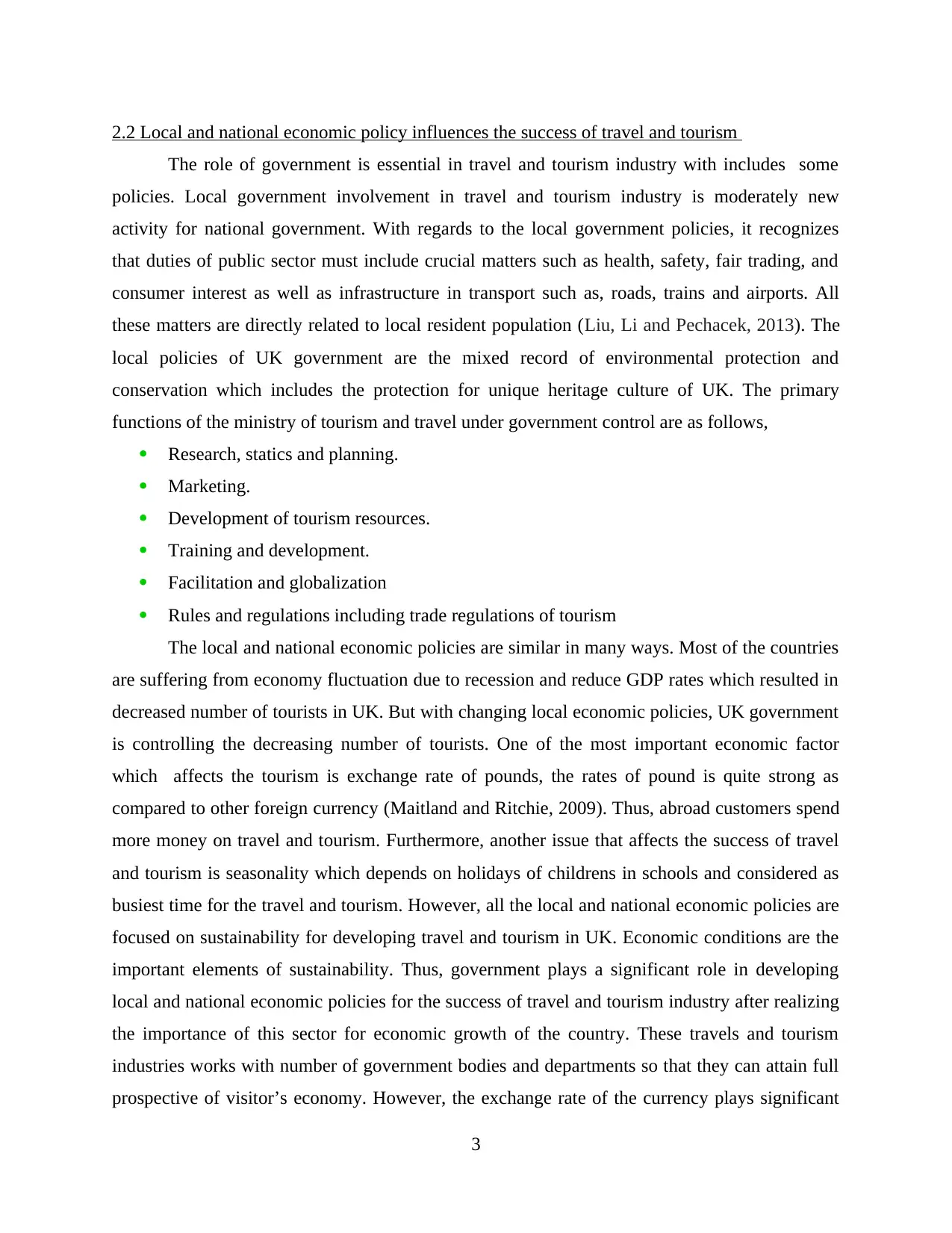
2.2 Local and national economic policy influences the success of travel and tourism
The role of government is essential in travel and tourism industry with includes some
policies. Local government involvement in travel and tourism industry is moderately new
activity for national government. With regards to the local government policies, it recognizes
that duties of public sector must include crucial matters such as health, safety, fair trading, and
consumer interest as well as infrastructure in transport such as, roads, trains and airports. All
these matters are directly related to local resident population (Liu, Li and Pechacek, 2013). The
local policies of UK government are the mixed record of environmental protection and
conservation which includes the protection for unique heritage culture of UK. The primary
functions of the ministry of tourism and travel under government control are as follows,
Research, statics and planning.
Marketing.
Development of tourism resources.
Training and development.
Facilitation and globalization
Rules and regulations including trade regulations of tourism
The local and national economic policies are similar in many ways. Most of the countries
are suffering from economy fluctuation due to recession and reduce GDP rates which resulted in
decreased number of tourists in UK. But with changing local economic policies, UK government
is controlling the decreasing number of tourists. One of the most important economic factor
which affects the tourism is exchange rate of pounds, the rates of pound is quite strong as
compared to other foreign currency (Maitland and Ritchie, 2009). Thus, abroad customers spend
more money on travel and tourism. Furthermore, another issue that affects the success of travel
and tourism is seasonality which depends on holidays of childrens in schools and considered as
busiest time for the travel and tourism. However, all the local and national economic policies are
focused on sustainability for developing travel and tourism in UK. Economic conditions are the
important elements of sustainability. Thus, government plays a significant role in developing
local and national economic policies for the success of travel and tourism industry after realizing
the importance of this sector for economic growth of the country. These travels and tourism
industries works with number of government bodies and departments so that they can attain full
prospective of visitor’s economy. However, the exchange rate of the currency plays significant
3
The role of government is essential in travel and tourism industry with includes some
policies. Local government involvement in travel and tourism industry is moderately new
activity for national government. With regards to the local government policies, it recognizes
that duties of public sector must include crucial matters such as health, safety, fair trading, and
consumer interest as well as infrastructure in transport such as, roads, trains and airports. All
these matters are directly related to local resident population (Liu, Li and Pechacek, 2013). The
local policies of UK government are the mixed record of environmental protection and
conservation which includes the protection for unique heritage culture of UK. The primary
functions of the ministry of tourism and travel under government control are as follows,
Research, statics and planning.
Marketing.
Development of tourism resources.
Training and development.
Facilitation and globalization
Rules and regulations including trade regulations of tourism
The local and national economic policies are similar in many ways. Most of the countries
are suffering from economy fluctuation due to recession and reduce GDP rates which resulted in
decreased number of tourists in UK. But with changing local economic policies, UK government
is controlling the decreasing number of tourists. One of the most important economic factor
which affects the tourism is exchange rate of pounds, the rates of pound is quite strong as
compared to other foreign currency (Maitland and Ritchie, 2009). Thus, abroad customers spend
more money on travel and tourism. Furthermore, another issue that affects the success of travel
and tourism is seasonality which depends on holidays of childrens in schools and considered as
busiest time for the travel and tourism. However, all the local and national economic policies are
focused on sustainability for developing travel and tourism in UK. Economic conditions are the
important elements of sustainability. Thus, government plays a significant role in developing
local and national economic policies for the success of travel and tourism industry after realizing
the importance of this sector for economic growth of the country. These travels and tourism
industries works with number of government bodies and departments so that they can attain full
prospective of visitor’s economy. However, the exchange rate of the currency plays significant
3
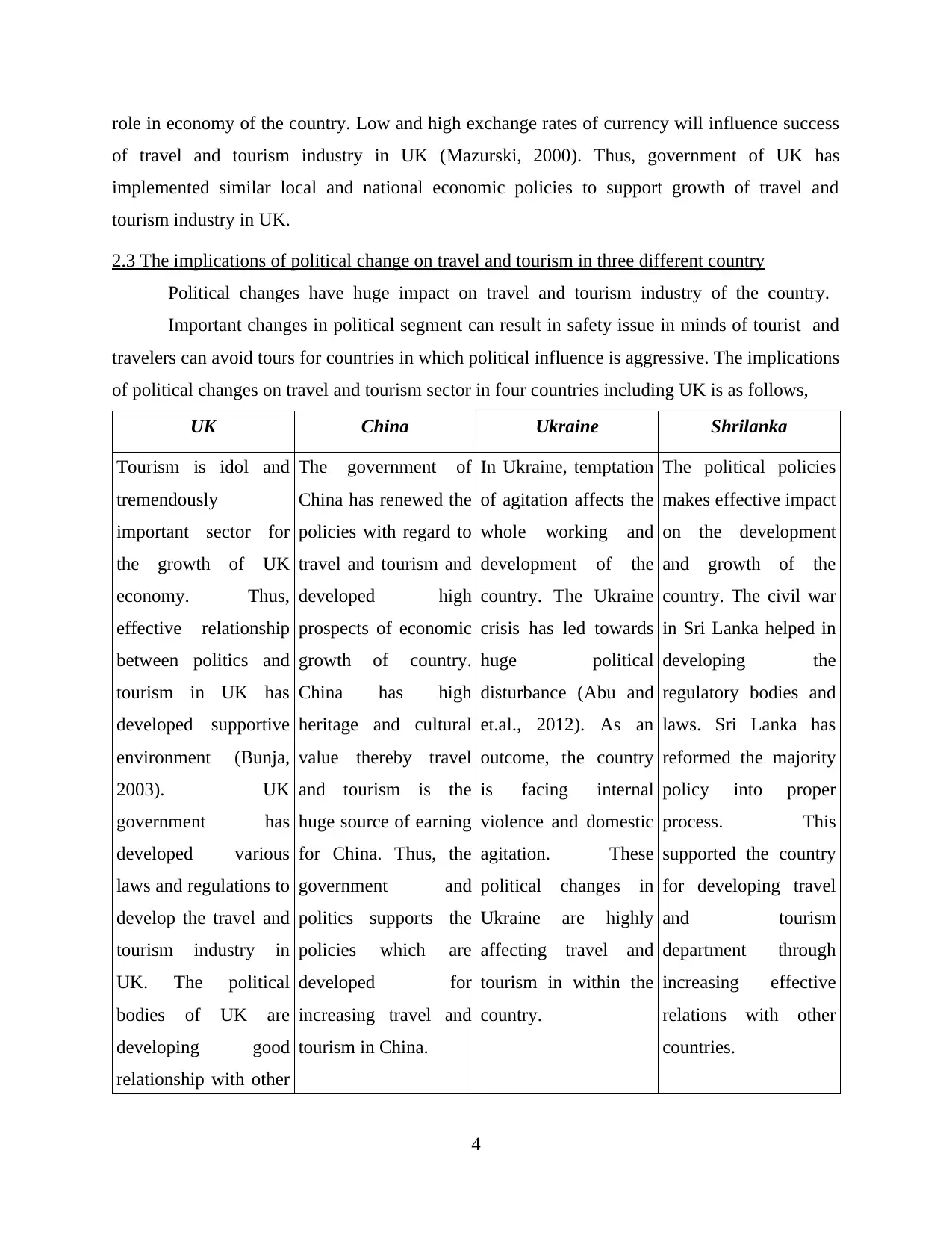
role in economy of the country. Low and high exchange rates of currency will influence success
of travel and tourism industry in UK (Mazurski, 2000). Thus, government of UK has
implemented similar local and national economic policies to support growth of travel and
tourism industry in UK.
2.3 The implications of political change on travel and tourism in three different country
Political changes have huge impact on travel and tourism industry of the country.
Important changes in political segment can result in safety issue in minds of tourist and
travelers can avoid tours for countries in which political influence is aggressive. The implications
of political changes on travel and tourism sector in four countries including UK is as follows,
UK China Ukraine Shrilanka
Tourism is idol and
tremendously
important sector for
the growth of UK
economy. Thus,
effective relationship
between politics and
tourism in UK has
developed supportive
environment (Bunja,
2003). UK
government has
developed various
laws and regulations to
develop the travel and
tourism industry in
UK. The political
bodies of UK are
developing good
relationship with other
The government of
China has renewed the
policies with regard to
travel and tourism and
developed high
prospects of economic
growth of country.
China has high
heritage and cultural
value thereby travel
and tourism is the
huge source of earning
for China. Thus, the
government and
politics supports the
policies which are
developed for
increasing travel and
tourism in China.
In Ukraine, temptation
of agitation affects the
whole working and
development of the
country. The Ukraine
crisis has led towards
huge political
disturbance (Abu and
et.al., 2012). As an
outcome, the country
is facing internal
violence and domestic
agitation. These
political changes in
Ukraine are highly
affecting travel and
tourism in within the
country.
The political policies
makes effective impact
on the development
and growth of the
country. The civil war
in Sri Lanka helped in
developing the
regulatory bodies and
laws. Sri Lanka has
reformed the majority
policy into proper
process. This
supported the country
for developing travel
and tourism
department through
increasing effective
relations with other
countries.
4
of travel and tourism industry in UK (Mazurski, 2000). Thus, government of UK has
implemented similar local and national economic policies to support growth of travel and
tourism industry in UK.
2.3 The implications of political change on travel and tourism in three different country
Political changes have huge impact on travel and tourism industry of the country.
Important changes in political segment can result in safety issue in minds of tourist and
travelers can avoid tours for countries in which political influence is aggressive. The implications
of political changes on travel and tourism sector in four countries including UK is as follows,
UK China Ukraine Shrilanka
Tourism is idol and
tremendously
important sector for
the growth of UK
economy. Thus,
effective relationship
between politics and
tourism in UK has
developed supportive
environment (Bunja,
2003). UK
government has
developed various
laws and regulations to
develop the travel and
tourism industry in
UK. The political
bodies of UK are
developing good
relationship with other
The government of
China has renewed the
policies with regard to
travel and tourism and
developed high
prospects of economic
growth of country.
China has high
heritage and cultural
value thereby travel
and tourism is the
huge source of earning
for China. Thus, the
government and
politics supports the
policies which are
developed for
increasing travel and
tourism in China.
In Ukraine, temptation
of agitation affects the
whole working and
development of the
country. The Ukraine
crisis has led towards
huge political
disturbance (Abu and
et.al., 2012). As an
outcome, the country
is facing internal
violence and domestic
agitation. These
political changes in
Ukraine are highly
affecting travel and
tourism in within the
country.
The political policies
makes effective impact
on the development
and growth of the
country. The civil war
in Sri Lanka helped in
developing the
regulatory bodies and
laws. Sri Lanka has
reformed the majority
policy into proper
process. This
supported the country
for developing travel
and tourism
department through
increasing effective
relations with other
countries.
4
⊘ This is a preview!⊘
Do you want full access?
Subscribe today to unlock all pages.

Trusted by 1+ million students worldwide
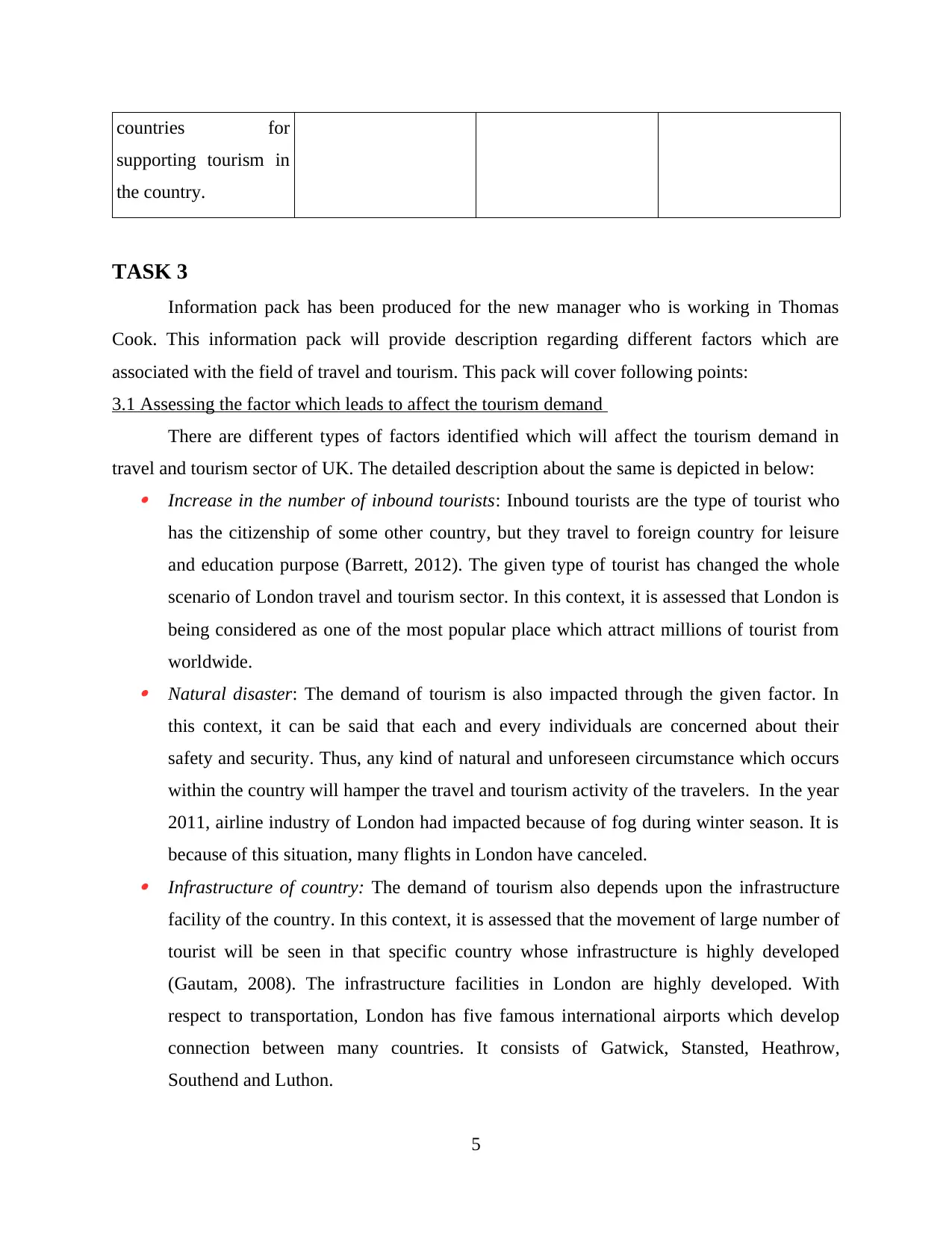
countries for
supporting tourism in
the country.
TASK 3
Information pack has been produced for the new manager who is working in Thomas
Cook. This information pack will provide description regarding different factors which are
associated with the field of travel and tourism. This pack will cover following points:
3.1 Assessing the factor which leads to affect the tourism demand
There are different types of factors identified which will affect the tourism demand in
travel and tourism sector of UK. The detailed description about the same is depicted in below: Increase in the number of inbound tourists: Inbound tourists are the type of tourist who
has the citizenship of some other country, but they travel to foreign country for leisure
and education purpose (Barrett, 2012). The given type of tourist has changed the whole
scenario of London travel and tourism sector. In this context, it is assessed that London is
being considered as one of the most popular place which attract millions of tourist from
worldwide. Natural disaster: The demand of tourism is also impacted through the given factor. In
this context, it can be said that each and every individuals are concerned about their
safety and security. Thus, any kind of natural and unforeseen circumstance which occurs
within the country will hamper the travel and tourism activity of the travelers. In the year
2011, airline industry of London had impacted because of fog during winter season. It is
because of this situation, many flights in London have canceled. Infrastructure of country: The demand of tourism also depends upon the infrastructure
facility of the country. In this context, it is assessed that the movement of large number of
tourist will be seen in that specific country whose infrastructure is highly developed
(Gautam, 2008). The infrastructure facilities in London are highly developed. With
respect to transportation, London has five famous international airports which develop
connection between many countries. It consists of Gatwick, Stansted, Heathrow,
Southend and Luthon.
5
supporting tourism in
the country.
TASK 3
Information pack has been produced for the new manager who is working in Thomas
Cook. This information pack will provide description regarding different factors which are
associated with the field of travel and tourism. This pack will cover following points:
3.1 Assessing the factor which leads to affect the tourism demand
There are different types of factors identified which will affect the tourism demand in
travel and tourism sector of UK. The detailed description about the same is depicted in below: Increase in the number of inbound tourists: Inbound tourists are the type of tourist who
has the citizenship of some other country, but they travel to foreign country for leisure
and education purpose (Barrett, 2012). The given type of tourist has changed the whole
scenario of London travel and tourism sector. In this context, it is assessed that London is
being considered as one of the most popular place which attract millions of tourist from
worldwide. Natural disaster: The demand of tourism is also impacted through the given factor. In
this context, it can be said that each and every individuals are concerned about their
safety and security. Thus, any kind of natural and unforeseen circumstance which occurs
within the country will hamper the travel and tourism activity of the travelers. In the year
2011, airline industry of London had impacted because of fog during winter season. It is
because of this situation, many flights in London have canceled. Infrastructure of country: The demand of tourism also depends upon the infrastructure
facility of the country. In this context, it is assessed that the movement of large number of
tourist will be seen in that specific country whose infrastructure is highly developed
(Gautam, 2008). The infrastructure facilities in London are highly developed. With
respect to transportation, London has five famous international airports which develop
connection between many countries. It consists of Gatwick, Stansted, Heathrow,
Southend and Luthon.
5
Paraphrase This Document
Need a fresh take? Get an instant paraphrase of this document with our AI Paraphraser
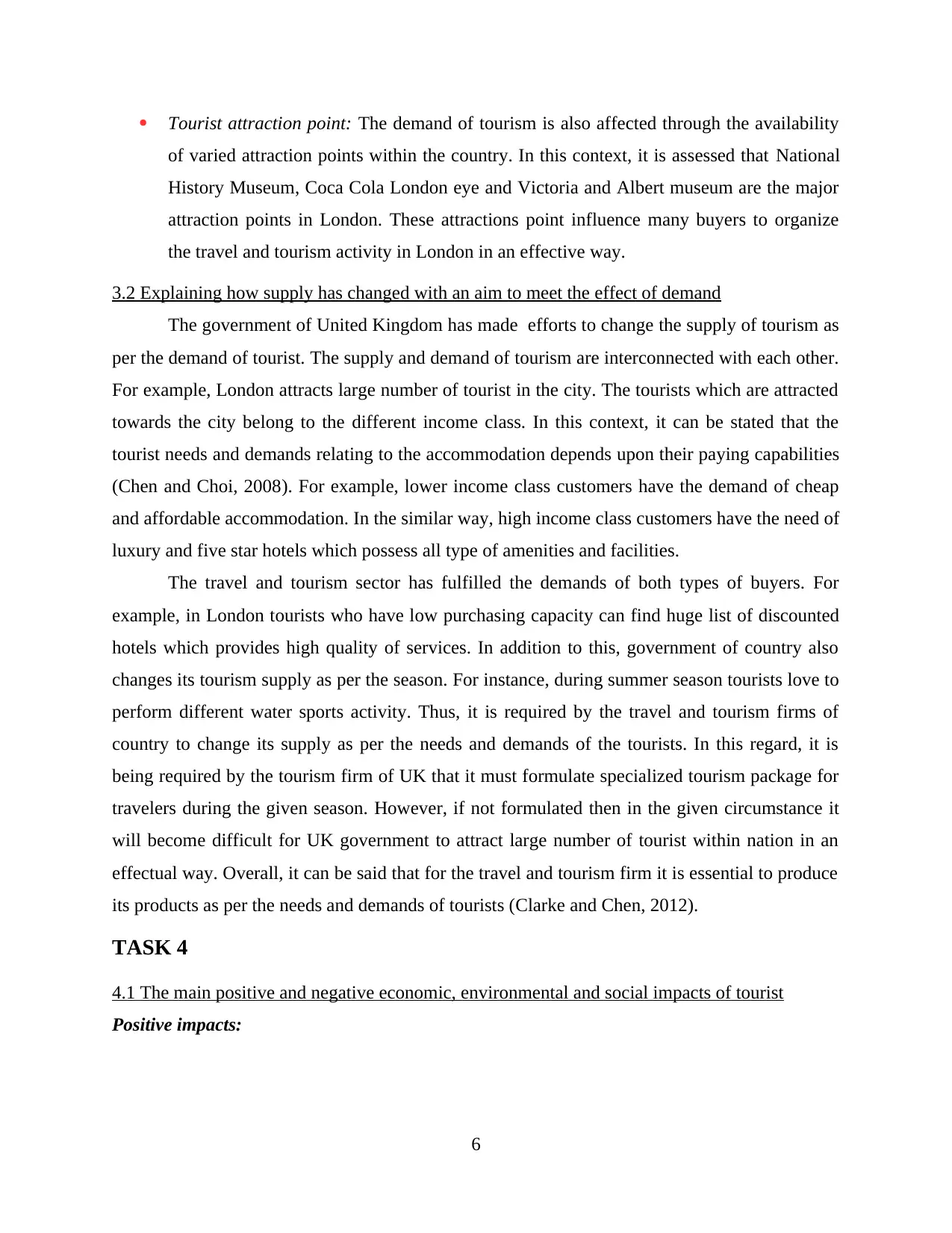
Tourist attraction point: The demand of tourism is also affected through the availability
of varied attraction points within the country. In this context, it is assessed that National
History Museum, Coca Cola London eye and Victoria and Albert museum are the major
attraction points in London. These attractions point influence many buyers to organize
the travel and tourism activity in London in an effective way.
3.2 Explaining how supply has changed with an aim to meet the effect of demand
The government of United Kingdom has made efforts to change the supply of tourism as
per the demand of tourist. The supply and demand of tourism are interconnected with each other.
For example, London attracts large number of tourist in the city. The tourists which are attracted
towards the city belong to the different income class. In this context, it can be stated that the
tourist needs and demands relating to the accommodation depends upon their paying capabilities
(Chen and Choi, 2008). For example, lower income class customers have the demand of cheap
and affordable accommodation. In the similar way, high income class customers have the need of
luxury and five star hotels which possess all type of amenities and facilities.
The travel and tourism sector has fulfilled the demands of both types of buyers. For
example, in London tourists who have low purchasing capacity can find huge list of discounted
hotels which provides high quality of services. In addition to this, government of country also
changes its tourism supply as per the season. For instance, during summer season tourists love to
perform different water sports activity. Thus, it is required by the travel and tourism firms of
country to change its supply as per the needs and demands of the tourists. In this regard, it is
being required by the tourism firm of UK that it must formulate specialized tourism package for
travelers during the given season. However, if not formulated then in the given circumstance it
will become difficult for UK government to attract large number of tourist within nation in an
effectual way. Overall, it can be said that for the travel and tourism firm it is essential to produce
its products as per the needs and demands of tourists (Clarke and Chen, 2012).
TASK 4
4.1 The main positive and negative economic, environmental and social impacts of tourist
Positive impacts:
6
of varied attraction points within the country. In this context, it is assessed that National
History Museum, Coca Cola London eye and Victoria and Albert museum are the major
attraction points in London. These attractions point influence many buyers to organize
the travel and tourism activity in London in an effective way.
3.2 Explaining how supply has changed with an aim to meet the effect of demand
The government of United Kingdom has made efforts to change the supply of tourism as
per the demand of tourist. The supply and demand of tourism are interconnected with each other.
For example, London attracts large number of tourist in the city. The tourists which are attracted
towards the city belong to the different income class. In this context, it can be stated that the
tourist needs and demands relating to the accommodation depends upon their paying capabilities
(Chen and Choi, 2008). For example, lower income class customers have the demand of cheap
and affordable accommodation. In the similar way, high income class customers have the need of
luxury and five star hotels which possess all type of amenities and facilities.
The travel and tourism sector has fulfilled the demands of both types of buyers. For
example, in London tourists who have low purchasing capacity can find huge list of discounted
hotels which provides high quality of services. In addition to this, government of country also
changes its tourism supply as per the season. For instance, during summer season tourists love to
perform different water sports activity. Thus, it is required by the travel and tourism firms of
country to change its supply as per the needs and demands of the tourists. In this regard, it is
being required by the tourism firm of UK that it must formulate specialized tourism package for
travelers during the given season. However, if not formulated then in the given circumstance it
will become difficult for UK government to attract large number of tourist within nation in an
effectual way. Overall, it can be said that for the travel and tourism firm it is essential to produce
its products as per the needs and demands of tourists (Clarke and Chen, 2012).
TASK 4
4.1 The main positive and negative economic, environmental and social impacts of tourist
Positive impacts:
6
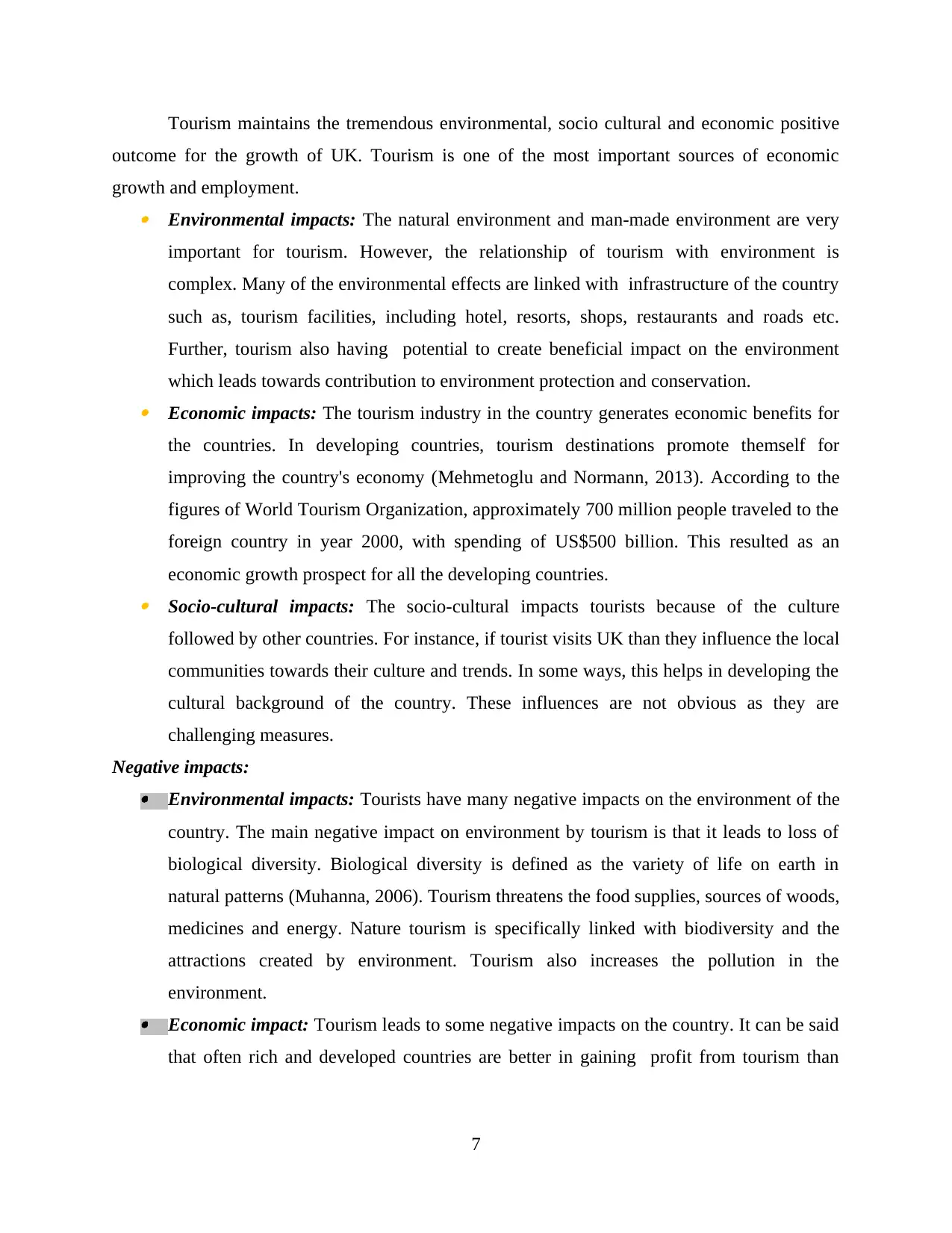
Tourism maintains the tremendous environmental, socio cultural and economic positive
outcome for the growth of UK. Tourism is one of the most important sources of economic
growth and employment. Environmental impacts: The natural environment and man-made environment are very
important for tourism. However, the relationship of tourism with environment is
complex. Many of the environmental effects are linked with infrastructure of the country
such as, tourism facilities, including hotel, resorts, shops, restaurants and roads etc.
Further, tourism also having potential to create beneficial impact on the environment
which leads towards contribution to environment protection and conservation. Economic impacts: The tourism industry in the country generates economic benefits for
the countries. In developing countries, tourism destinations promote themself for
improving the country's economy (Mehmetoglu and Normann, 2013). According to the
figures of World Tourism Organization, approximately 700 million people traveled to the
foreign country in year 2000, with spending of US$500 billion. This resulted as an
economic growth prospect for all the developing countries. Socio-cultural impacts: The socio-cultural impacts tourists because of the culture
followed by other countries. For instance, if tourist visits UK than they influence the local
communities towards their culture and trends. In some ways, this helps in developing the
cultural background of the country. These influences are not obvious as they are
challenging measures.
Negative impacts: Environmental impacts: Tourists have many negative impacts on the environment of the
country. The main negative impact on environment by tourism is that it leads to loss of
biological diversity. Biological diversity is defined as the variety of life on earth in
natural patterns (Muhanna, 2006). Tourism threatens the food supplies, sources of woods,
medicines and energy. Nature tourism is specifically linked with biodiversity and the
attractions created by environment. Tourism also increases the pollution in the
environment. Economic impact: Tourism leads to some negative impacts on the country. It can be said
that often rich and developed countries are better in gaining profit from tourism than
7
outcome for the growth of UK. Tourism is one of the most important sources of economic
growth and employment. Environmental impacts: The natural environment and man-made environment are very
important for tourism. However, the relationship of tourism with environment is
complex. Many of the environmental effects are linked with infrastructure of the country
such as, tourism facilities, including hotel, resorts, shops, restaurants and roads etc.
Further, tourism also having potential to create beneficial impact on the environment
which leads towards contribution to environment protection and conservation. Economic impacts: The tourism industry in the country generates economic benefits for
the countries. In developing countries, tourism destinations promote themself for
improving the country's economy (Mehmetoglu and Normann, 2013). According to the
figures of World Tourism Organization, approximately 700 million people traveled to the
foreign country in year 2000, with spending of US$500 billion. This resulted as an
economic growth prospect for all the developing countries. Socio-cultural impacts: The socio-cultural impacts tourists because of the culture
followed by other countries. For instance, if tourist visits UK than they influence the local
communities towards their culture and trends. In some ways, this helps in developing the
cultural background of the country. These influences are not obvious as they are
challenging measures.
Negative impacts: Environmental impacts: Tourists have many negative impacts on the environment of the
country. The main negative impact on environment by tourism is that it leads to loss of
biological diversity. Biological diversity is defined as the variety of life on earth in
natural patterns (Muhanna, 2006). Tourism threatens the food supplies, sources of woods,
medicines and energy. Nature tourism is specifically linked with biodiversity and the
attractions created by environment. Tourism also increases the pollution in the
environment. Economic impact: Tourism leads to some negative impacts on the country. It can be said
that often rich and developed countries are better in gaining profit from tourism than
7
⊘ This is a preview!⊘
Do you want full access?
Subscribe today to unlock all pages.

Trusted by 1+ million students worldwide
1 out of 16
Related Documents
Your All-in-One AI-Powered Toolkit for Academic Success.
+13062052269
info@desklib.com
Available 24*7 on WhatsApp / Email
![[object Object]](/_next/static/media/star-bottom.7253800d.svg)
Unlock your academic potential
Copyright © 2020–2026 A2Z Services. All Rights Reserved. Developed and managed by ZUCOL.





